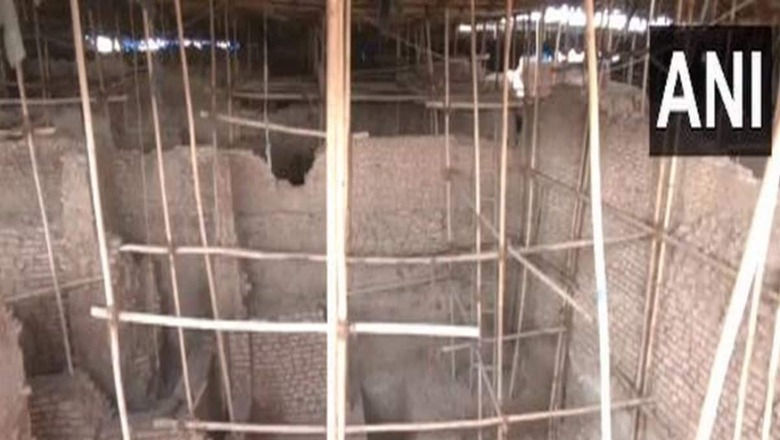
views
The remains of a 2,800-year-old human settlement have been discovered in Prime Minister Narendra Modi’s native village in Gujarat’s Vadnagar. Evidence of a settlement that is as old as 800 BCE (Before the Christian Era) in Vadnagar has been found by researchers from IIT Kharagpur, Archaeological Survey of India (ASI), Physical Research Laboratory (PRL), Jawaharlal Nehru University (JNU) and Deccan College.
Vadnagar has been a multi-cultural and multi-religious (Buddhist, Hindu, Jain and Islamic) settlement.
#WATCH | Gujarat: Remains of a 2800-year-old settlement found in PM Narendra Modi’s village, Vadnagar. pic.twitter.com/Fefjt7Dn9Z— ANI (@ANI) January 16, 2024
The excavation work- in Vadnagar, which has been going on since 2016, revealed the presence of seven cultural stages at the site, according to Dr Anindya Sarkar, Professor of Geology and Geophysics at IIT Kharagpur.
What Researchers Found In Vadnagar?
The study of deep archaeological excavation at Vadnagar indicates that the rise and fall of different kingdoms during this long 3,000 years and recurrent invasions of India by central Asian warriors were driven by severe changes in climate like rainfall or droughts, IIT Kharagpur said in a statement.
Excavation in Vadnagar’s several deep trenches revealed the presence of seven cultural stages (periods) namely– Mauryan, Indo-Greek, Indo-Scythian or Shaka-Kshatrapas, Hindu-Solankis, Sultanate-Mughal (Islamic) to Gaekwad-British colonial rule– and the city is continuing even today.
One of the oldest Buddhist monasteries has also been discovered during the excavation, the statement said
“We found characteristic archaeological artefacts, potteries, copper, gold, silver and iron objects and intricately designed bangles. We also found coin moulds of Greek king Appollodatus during the Indo-Greek rule at Vadnagar,” said ASI archaeologist Abhijit Ambekar, co-author of the paper who led the excavation from 2016.
He claimed that the evidence collected by their team makes Vadnagar the oldest living city within a single fortification unearthed so far in India.
What’s Unique About Discoveries in Vadnagar?
Vadnagar is unique in the sense that such a continuous record of early historic to medieval archaeology with precise chronology has not been discovered elsewhere in India.
“Some of our recent unpublished radiocarbon dates suggest that the settlement could be as old as 1400 BCE contemporary to the very late phase of the post-urban Harappan period. If true then it suggests a cultural continuity in India for the last 5,500 years and the so-called Dark Age may be a myth,” said IIT professor Rs Sarkar, who is also the lead author of the paper.
“The earliest settlement period in Vadnagar started at least at 800 year BCE, that is early Iron Age or questionably Late Vedic period and pre-dates both Buddhism and Jainism. This period continues into the Mauryan rule and ends with its fall around 150 year BCE. After the downfall of the Gupta Empire, large-scale de-urbanisation, drying up of water bodies, famines and population contraction across India occurred”, Dr Sarkar noted.
According to the IIT professor, during the last 2,200 years of tumultuous time of Indian history, there were seven invasions from central Asia to India (including Gujarat), imprints of which can also be found in the successive cultural periods of Vadnagar.
“Our isotope data and dates of the cultural periods at Vadnagar suggest that all these invasions happened precisely when the agrarian Indian subcontinent was prosperous with stronger monsoon but central Asia was extremely dry and uninhabitable with recurrent droughts from where almost all the invasions and migrations happened”, he added.
About the Study in Vadnagar
The excavation in Vadnagar was led by ASI, and the study was funded by the Directorate of Archaeology & Museums Government of Gujarat which is entrusted with building India’s first experiential digital museum (experiential means the process of learning through experience) at Vadnagar.
The ASI had worked on the site from 2016-2023 and has excavated up to a depth of 20 meters.
As per Archaeological Supervisor Mukesh Thakor, more than a lakh remains have been unearthed so far and around 30 sites have been evacuated.
The findings of the research have just been published in a paper titled ‘Climate, human settlement, and migration in South Asia from Early historic to medieval period: evidence from new archaeological excavation at Vadnagar, Western India’ in the prestigious Elsevier journal ‘Quaternary Science Reviews’.
The research at Vadnagar and Indus Valley civilisation has also been supported by funding from Sudha Murthy, former Chairperson, Infosys Foundation.
(With ANI and PTI Inputs)


















Comments
0 comment